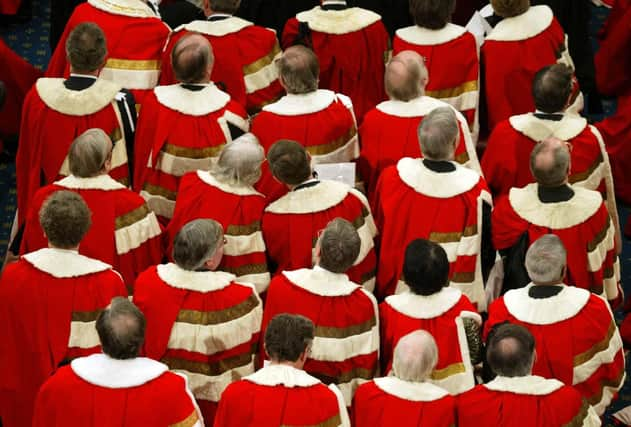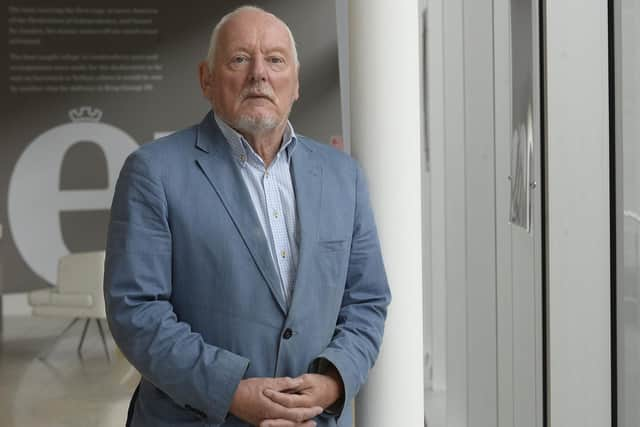Jeff Dudgeon: After years of imbalance against state forces in historic Troubles investigations, a new legacy law has been passed


Yesterday, in the House of Lords, the Northern Ireland Troubles (Legacy and Reconciliation) Bill concluded its year-long parliamentary passage. It now becomes an Act.
The new law was promised in the 2019 Conservative manifesto so the Lords was eventually going to give way to the Commons. All that is left is for the king to give Royal Assent, assuming he does not take Bertie Ahern’s advice and refuse – thereby creating a constitutional crisis.
Advertisement
Hide AdAdvertisement
Hide AdThe end was something of a whimper as there was no division on the government motion. It asked Lords to agree with the Commons and reinstate the provision that gives immunity from Troubles-related prosecution. The reason offered was: “Giving family members a role in whether immunity should be granted or not would critically undermine the effectiveness of delivering on the principal aim of this legislation.”


In July and again a week ago, the Commons voted down Lords amendments on immunity and Kenova (the judicially required re-investigations of a number murders led by Jon Boutcher). The government had been narrowly defeated on both. Lord Hain had successfully proposed continued criminal re-investigations – not reviews – of many other Troubles murders, requiring them to be on Boutcher’s Kenova model, and subject to the European Convention on Human Rights (ECHR). The government however earlier added a requirement for compliance with the Human Rights Act. It had written the ECHR into UK law so that aspect was covered, at least domestically.
Hain’s complicated amendment meant the new arrangements would have been little different from before, with limitless time and funding required. Given that I estimate that some £2 billion has been spent on seriously unbalanced Troubles reinvestigations, for little value and near zero prosecutions, that was not a prospect the NIO could allow. It would also have jeopardised the bill’s “principal objective to promote reconciliation”, another late NIO amendment. Peter Hain as secretary of state had introduced amnesty legislation in 2005 that was vetoed by Sinn Fein when it became clear that veterans, as well as terrorists, could benefit. Instead the IRA was offered ‘On The Run’ letters.
Royal Assent for the Legacy Act will give the go-ahead for the Independent Commission for Reconciliation and Information Recovery (ICRIR), under Chief Commissioner, Sir Declan Morgan, to commence operationally. Appointments to the body have already been made while we await with special interest the name of the investigations commissioner.
Advertisement
Hide AdAdvertisement
Hide AdIn May 2024, ICRIR will take over all legacy reinvestigations – from the PSNI’s Legacy Investigation Branch (LIB), the Police Ombudsman (PONI), and Operation Kenova. New civil suits have already been stopped and most re-opened inquests will be subsumed into ICRIR. The PSNI LIB replaced the foolishly disbanded Historical Enquiries Team (HET), a successful project of Sir Hugh Orde when chief constable, and one approved by Strasbourg. Where no compelling new evidence is presented to ICRIR, it is likely most outstanding Troubles deaths will be addressed in a similar way to HET, but in a speeded up process not LIB’s glacial pace, alongside significant release of official documentation. This will have to be redacted for human rights and data protection reasons, something academic opponents of the bill do not recognise. Kenova, under Jon Boutcher, involved four reinvestigations, commissioned by the PSNI after judicial rulings. His reports are still pending as are any successful prosecutions. Kenova will have cost nearly £50 million by the time it shuts down, which is 20% of ICRIR’s five-year budget. A side issue, needing research, is just how much it is costing to meet judicial decisions to re-open old cases, something only beginning to be discussed in England.
PONI’s workload on historic RUC cases and allegations of collusion or ineffectiveness was largely developed outside statute. It has been contested in judicial reviews taken by retired police officers. How ICRIR addresses collusion allegations and detaches non-criminal police misconduct from actual murder inquiries will be a key area. Indeed the system that Sir Declan Morgan introduces for all reviews will be critical to ICRIR’s success.
The Malone House Group’s greatest fear is mission creep, most especially in relation to how ICRIR deals with inquests and their current imbalance, an area the chief commissioner is aware of. We helped peers draft amendments to the bill especially on ICRIR’s scope. Aside from that relating to compensation for Gerry Adams, the NIO turned them down but there is no doubt that some of its amendments and accompanying ministerial remarks took account of them. These remarks can be very useful in determining the future judicial reviews that Sir Declan anticipates.
The Legacy Act will soon be statute law which makes it unlikely local courts would try to strike it down although it might ultimately take the Supreme Court to decide. Strasbourg is a different, and more prolonged matter.
Advertisement
Hide AdAdvertisement
Hide AdResistance to the act hotted up in recent days as conclusion neared. Responses on social media, and in BBC stories, have become highly charged, emotional to the point of hysteria. QUB’s Law Department, notably, is campaigning through unashamedly unbalanced public and private meetings to make Dublin take another inter-state case against the UK at Strasbourg.
Queen’s Professor Anna Bryson in an Irish Times article (September 7) said there are compelling reasons why the Irish government “is right to give serious and detailed consideration” to such a case. It could go directly to the ECHR without the need to first exhaust domestic remedies, and would consider the proposals “comprehensively and holistically” rather than focusing on the particular circumstances of an individual case.
Ominously, she added Strasbourg’s power to ask for interim measures to put a temporary halt on the legislation could be hugely important. This is what happened to stop migrant flights to Rwanda.
• Jeff Dudgeon is convenor of the Malone House Group